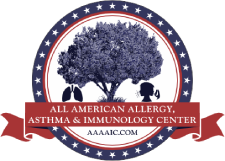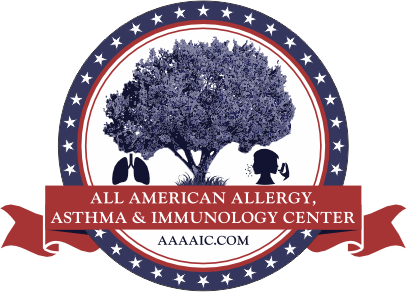Ragweed season is upon us again in South Texas and will likely remain in significant numbers through November due to high temperatures and windy conditions. Ragweed season typically starts in September and lasts until November.
Ragweed pollen is one of the most immunopotent aeroallergens. This is due to several factors to include size (only 15-25um in diameter; easily enters upper and lower airways), weight (highly buoyant; can be found 2 miles high and 400 miles at sea), drought tolerant, high numbers (1 ragweed plant can release up to 1 billion pollen), and allergenicity (it only takes 10 pollen grains to trigger an allergic reaction). Ragweed season is the second most common season for asthma flares.
Common symptoms include:
- Itchy Sinuses
- Watery/Itchy Eyes
- Sneezing fits
- Postnasal drainage with or without coughing
- Itchy skin with or without hives

People with ragweed allergy sometimes have allergy symptoms with certain raw fruits and vegetables due to their cross reactivity with ragweed. This syndrome is called Pollen Food Allergy Syndrome (PFAS). Some of them are:
- Banana
- Cantaloupe
- Cucumber
- Honeydew Melon
- Watermelon
- White potato
- Zucchini
- Sunflower seeds

Self Help Tips include:
- Wear protective wear such as face masks, eyewear, gaiter, and sleeves/pant
- Wear sunglasses and a wide brim hat to reduce pollen exposure
- Keep windows and doors closed
- Bath after coming from extended periods outdoors
- Wipe pets with damp cloth after returning from outdoors
- Vacuum with a HEPA filter
- Wash your bed linens and pillowcases in hot water at least weekly
- Use HEPA Air Purifiers in the house (small size 200 sq ft, medium size 200-400 sq ft, large size 400-1500 sq ft)
- Change out AC filters monthly
- Change out vehicle air cabin filters every 2 months
- Take over the counter intranasal steroid such as flonase or nasocort along with second generation antihistamine such as Xyzal, Zyrtec, or Allegra.
- For ocular symptoms try otc ophthalmic antihistamine such as pataday or zaditor.
- For sinus pressure and congestion an otc decongestant but for no longer than (3-4) days
- For potentially curative therapies, Aeroallergen Immunotherapy (AIT) is available in the forms of allergy injections/shots, sublingual tablets and/or sublingual drops. AIT can also reverse ragweed allergic patient’s symptoms with cross reactive fruits/vegetables (see PFAS above).
Contact us for more information at:


